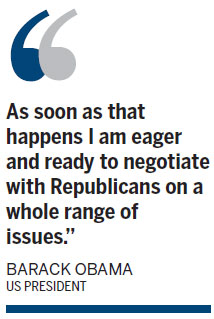US still in fiscal deadlock, but glimmers of hope emerge
A few faint glimmers of hope surfaced on Monday in the US fiscal standoff, both in Congress and at the White House, with President Barack Obama saying he would accept a short-term increase in the nation's borrowing authority to avoid a default.
Separately, a Senate aide said Republican Senator Rob Portman, from Ohio, who is influential on budget issues, was floating a plan to cut federal spending and reform the US tax code as part of a broader deal to reopen shuttered government agencies and raise the government's debt ceiling.
While Portman's initiative may or may not gain traction, most lawmakers believe that a budget deal like it will be necessary to end the stalemate.
Still, seven days into a government shutdown and only 10 days from a critical need to raise the nation's debt limit, nothing amounting to a breakthrough was in sight.

Senate Democrats could introduce a bill to raise the debt limit this week, according to a Democratic aide. Considering the procedural roadblocks the measure could face, aides said they have to get the legislation rolling well before Oct 17, when US Treasury Secretary Jack Lew has said the government will run out of borrowing authority.
It was uncertain whether Democrats can muster the 60 votes they would need to push a debt ceiling bill, with no strings attached, through the Senate. The measure would likely run into opposition from Senate Republicans such as Texas Senator Ted Cruz, who has been leading the drive to make delaying Obama's healthcare law a condition for raising the debt ceiling.
Democrats and Obama stepped up their criticism of House of Representatives Speaker John Boehner for refusing to schedule a vote on a separate unencumbered measure to fund the government and end the shutdown. They believe it would pass with most Democrats in the House voting for it along with a handful of Republicans. Boehner said on Sunday that it would fail.
"If Republicans and Speaker Boehner is saying there are not enough votes, then they should prove it," Obama said.
Obama open to talks
Obama said he is open to negotiations over his healthcare law, a slight change of tone, but only after Congress approves measures to end a weeklong government shutdown and raise the US debt ceiling.
"As soon as that happens, I am eager and ready to negotiate with Republicans on a whole range of issues: How do we create more jobs, how do we build the economy, how do we boost manufacturing," said Obama on a visit to the Federal Emergency Management Agency on Monday to spotlight the loss of government services because of the shutdown.
"I'm happy to talk about healthcare. I'm happy to talk about energy policy, how we deal with our long-term fiscal situation," he said.
Obama has been particularly resistant to any tampering with his healthcare law, which has experienced a series of problems in the initial rollout. Any negotiations over it would be aimed at tinkering with it to improve it, not cut funding for it as Republicans want, White House aides have said.
In the latest survey by the Washington Post and ABC News, 70 percent disapproved of the way Republicans in Congress are handling the conflict versus 61 percent who disapproved of congressional Democrats.
Obama came off the best, with 51 percent disapproving of his handling of the crisis. The margin of error was plus or minus 3.5 percentage points
Reuters-AP
(China Daily 10/09/2013 page12)








